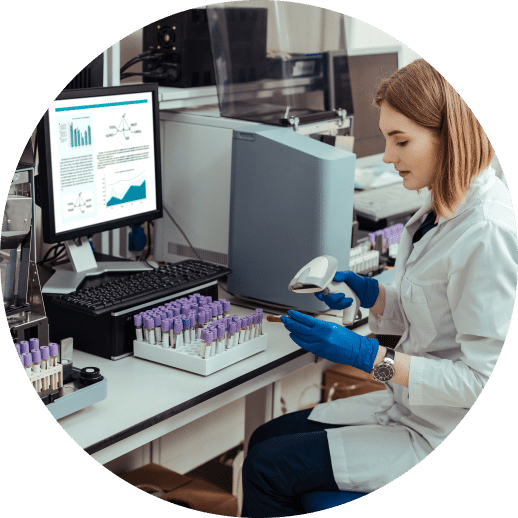Genetic Test Ordering
In this section, NHS colleagues can find information about the genomic tests available on the NHS in England, how to request tests from the North Thames GLH, and answers to frequently asked questions.

Genomic Tests available on the NHS in England
All genomic and genetic tests in the NHS in England are provided by a network of Genomic Laboratory Hubs (GLHs). The North Thames GLH delivers all genomic tests, including whole genome sequencing, for patients based in North London, Hertfordshire and Mid and South Essex.
The tests available are outlined in the National Genomic Test Directories for rare and inherited disorders and cancer. These directories provide information on the most appropriate test for clinical indications, who is eligible for testing, who can request tests and the technology used for testing.
Ordering a test
NHS colleagues in the North Thames can use our Find a Test tool to see which tests are available for certain clinical indications, patient eligibility requirements, request forms, sample requirements and laboratory details. This includes all tests from the National Genomic Test Directories.
If you know which test you want to order and how to order it, find all of our forms in one place on our test order form page.
The process for genomic testing
-
Identify the appropriate test for your patient in the national genomic test directory.
The test chosen will define the test request form needed, sample requirements, the laboratory within the GLH who will complete the test, and expected turnaround times for the results.
It will also identify who can request the test and if patients should be referred to clinical genetics.
-
Ensure an appropriate consent conversation is held with the patient, and complete appropriate request form and any accompanying documentation.
This should include discussions on the genomic test, the process for testing and the possible implications for a patient and their family members. A record of discussion must be retained within a patient record, or the test request form (see more information on consent and confidentiality).
-
Collect the sample(s).
The samples required depend on the specific test, and are often outlined within the request form.
-
Transportation of sample and request form to North Thames GLH laboratory.
The laboratory who will conduct the test depends on the specific test, and are often outlined within the request form.
-
Test and analysis conducted by the North Thames GLH, and clinical report delivered to requesting NHS colleague
View information about expected turnaround times for testing.
Detailed information about the test methodology used, the genes tested, and any limitations are provided as part of all clinical reports provided by the GLH. If you have questions about the details methodology, please reach out to the lab responsible for the test.
-
Results to be returned to the patient
For a list of resources and support groups that may help you provide ongoing support for your patient, please see our patient and education section.
If you are new to requesting tests or supporting patients through genomic testing, view our “New To Testing” training resources.
Visit our FAQs page for answers to common queries.